Improving Your Sleep Setup: A Guide to Optimizing Your Bedroom for Restful, Restorative Sleep
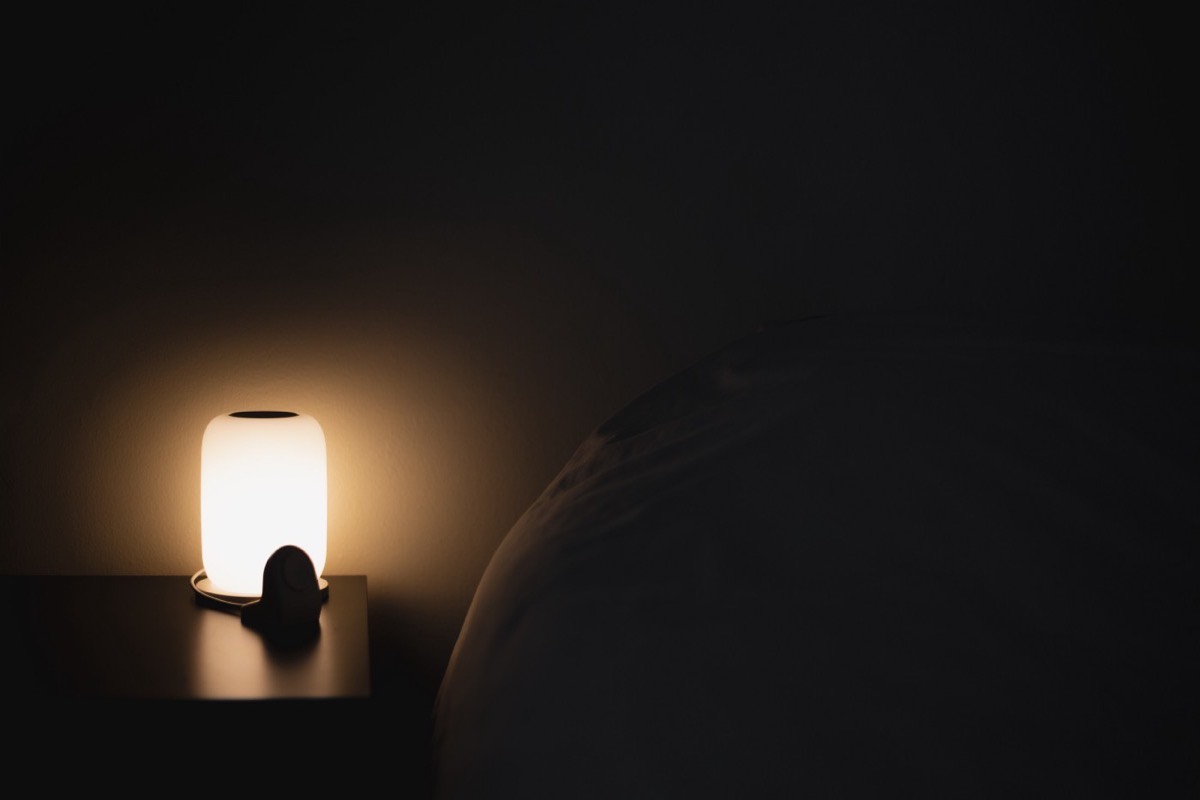
Living in a big city has its advantages, but a peaceful atmosphere is not one of them.
As our established reality retreats into the distance, I’ve found myself noticing little details of our quiet new world, like the absence of airplanes in the sky. The human noises of the city have given way to the sound of nature, grateful for our retreat.
With much of our noise pollution out of the way, the birds are no longer competing against a constant din. They’re just singing, and it’s uplifting.
Over the past year, even before the current crisis, my wife and I have been slowly optimizing our bedroom to try and create an oasis of rest. Together with a more intentional bedtime routine, this series of subtle changes has utterly transformed our quality of sleep.
I’d love to share our approach in the hopes of inspiring similar changes in your own sleep setup.
No Phones in the Bedroom
If you try nothing else, try this.
We were as guilty as the next people of having our phones be the first and last thing we looked at each day.
While magical and full of utility, smartphones can be tiny windows into seas of stress. They contain the firehose of information, tempting us to doomscroll, but they also provide access to smaller stressors like our task list, our calendars, our emails. 15 unread notifications. That homescreen we’ve been meaning to reorganize. That service we should really unsubscribe from.
Simply removing them from the bedroom environment has dramatically reduced the amount of anxiety that creeps up on us in the night.
And I do mean removing them from the room entirely — not just hiding them in a drawer or putting them in the closet to charge. A bogeyman hiding under your bed is no less stressful than one looming over you as you try to fall asleep.
Leave it in the office, the kitchen, the bathroom, the hall. Remember, out of sight, out of mind.
For those with children or dependants at risk, try to think of ways to stay connected without being tethered to your phone overnight. Use a baby monitor. Turn the ringer up so you can hear it if someone calls. You’re resourceful and you’ll think of something.
I know it doesn’t seem like having it on the other side of a door would make a difference, but try it.
It does.
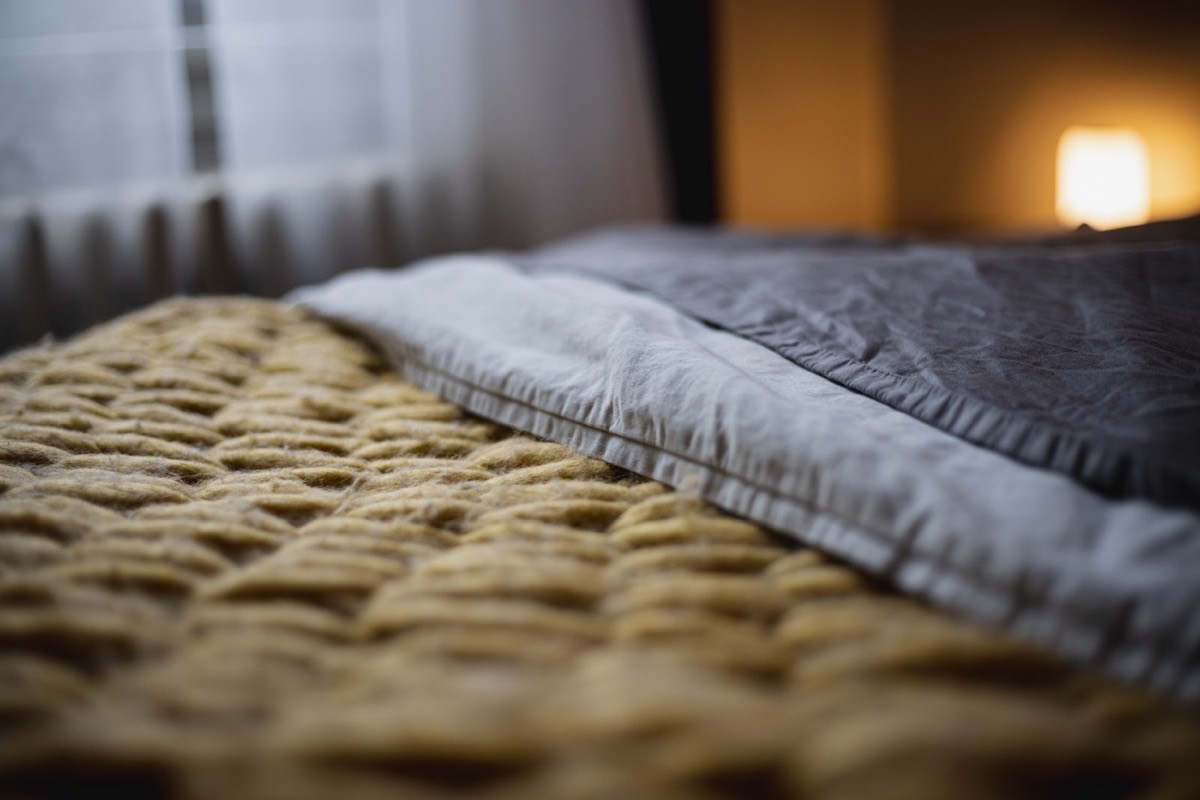
Don’t Skimp on Sleep Gear
It feels silly to spend a ton of money on a good mattress, quality sheets, and comfortable pajamas…or at least it does until you remember that you spend half your life using them.
In the same way that observing proper ergonomics is key to a comfortable workspace, being willing to invest in good sleep gear is an important part of improving your quality of rest.
You don’t have to spend a fortune, and you don’t have to upgrade everything all at once, but when the time comes to replace something, remind yourself that it’s one of the most impactful investments you can make for yourself.

Think About Lighting
We tend to think of artificial home lighting as a binary thing: the lights are either on or they’re off.
Smart home lighting has, among other things, begun to spread the idea of dimming, colored lights, and automation. These additional dimensions have aesthetic value, but I believe they also contribute to your state of mind.
In our bedroom, we have the normal overhead light that’s controlled by the light switch, but we don’t use that in the evenings. Instead, I have a set of Nanoleaf light panels installed above the bed, and a pair of Casper Glow lights — one on each nightstand.
The Nanoleaf turns on automatically near sunset, bathing the room in slowly shifting organic tones. I oscillate between cool, gentle light that mimics a moonlit sky, and warmer options that invite us to settle in and wind down for the night.
Once we’ve changed and brushed our teeth, I turn it off from my Apple Watch before climbing into bed.
The Casper lights are particularly delightful. You can flip one to turn both on, and they work like little luminous hourglasses: over the course of a half-hour, the light dims and becomes warmer before fading into darkness.
We flip them when we get into bed, and the fading light encourages our brains to follow along into sleep.
To ensure that the room is truly dark when the lights are out, we also bought a set of blackout curtains. In a city environment, light pollution interferes and can throw distracting glints and flickers around the room if not properly mitigated.
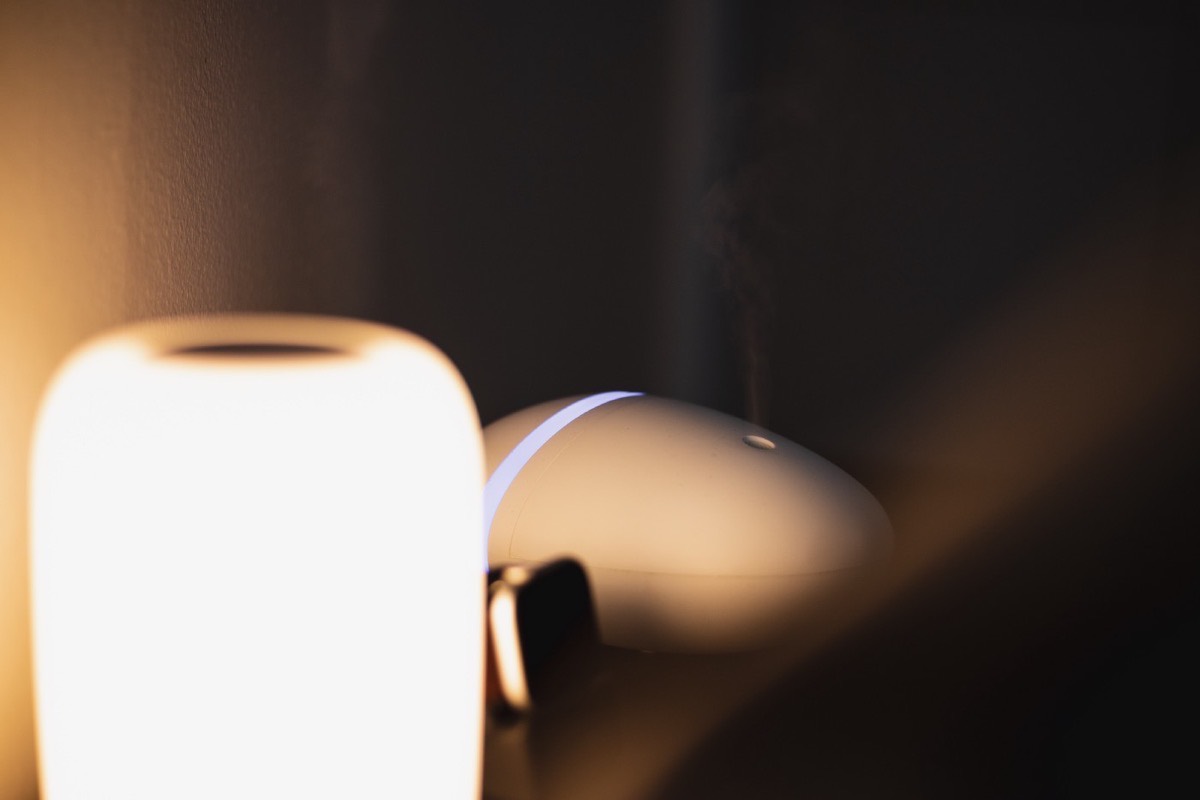
Think About Air Quality
Our apartment doesn’t have very good airflow, and the bedroom gets quite stuffy if the window isn’t open.
We normally leave it open during the day, but are forced to close it at night because of the ongoing racket of sirens, engines, and other sonic artifacts of human activity.
The city’s newfound quiet has meant that we can leave it open for now, and it’s been both a figurative and literal breath of fresh air.
Some years ago, I bought an air purifier for the living room to try and improve our indoor air quality. It made a noticeable difference and we’ve kept it running ever since. Having experienced its impact, I intend to buy a second unit for the bedroom so that we can maintain better air quality even when noise or temperatures force us to close the window again.
In parallel, we also run an essential oil diffuser for an hour or so in the evening. This mild attempt at aromatherapy makes a small but important contribution to the atmosphere of rest that we’re creating.
Experimenting with different oils — especially in concert with different light panel color schemes — has been a fun way to keep things fresh.
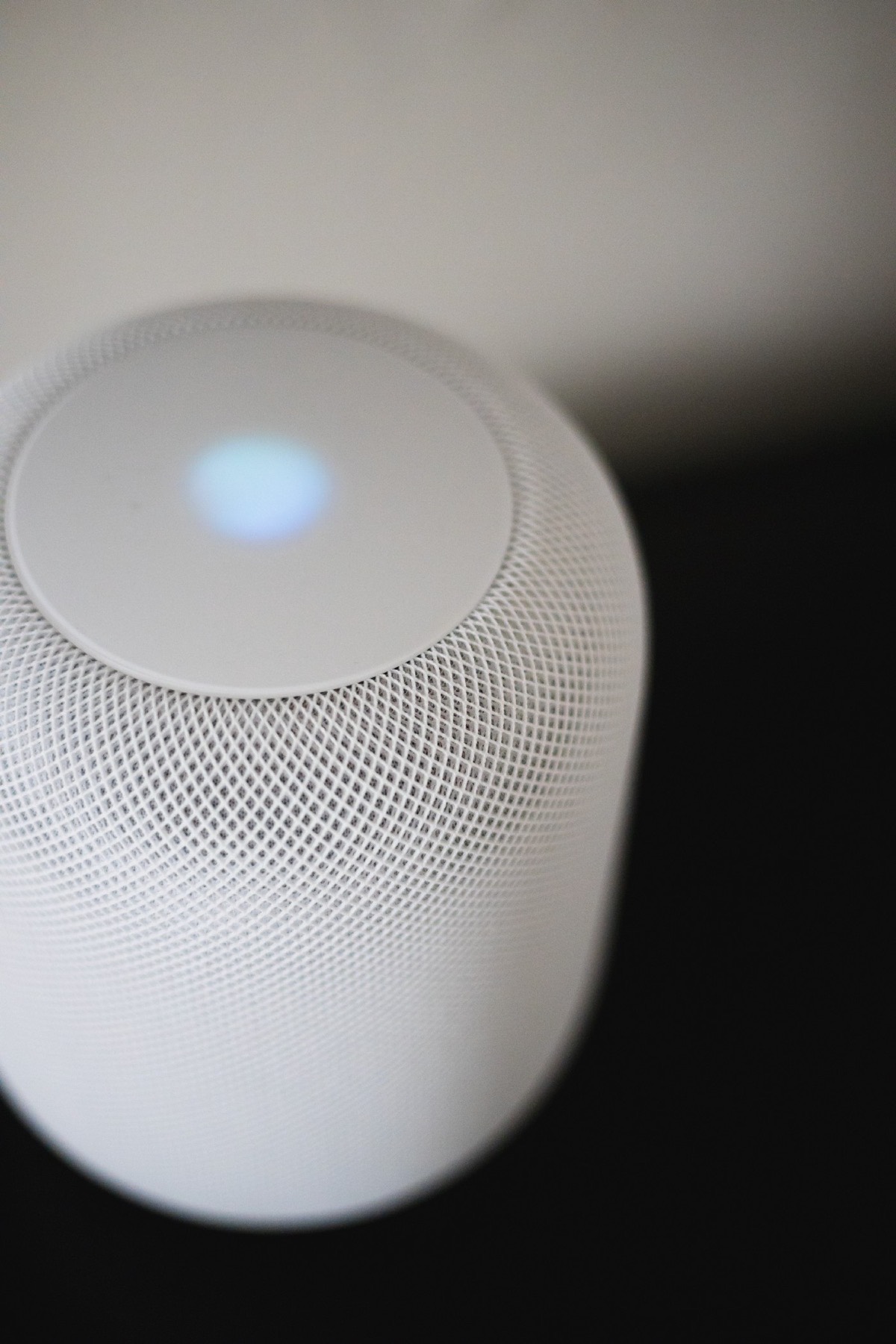
Think About Sound
For us, the noise of the city is clearly a source of stress, but sound can also be beneficial.
This is subjective, but I find that nature sounds help me relax before sleep. The sound of a quiet forest in the evening or the sound of waves lapping at the shore of a distant beach are both options that I turn to.
I’ve employed our Apple HomePod for this duty because its rich and balanced sonic profile is well suited to reproducing nature recordings in a convincing way. Using my nature sounds app of choice, I select my environment and set a 40-minute sleep timer when I leave my phone in the office to charge overnight.
Then I can wander into the bedroom — now transformed into a zen garden, or forest campsite, or beachfront bungalow — and settle into bed to read.
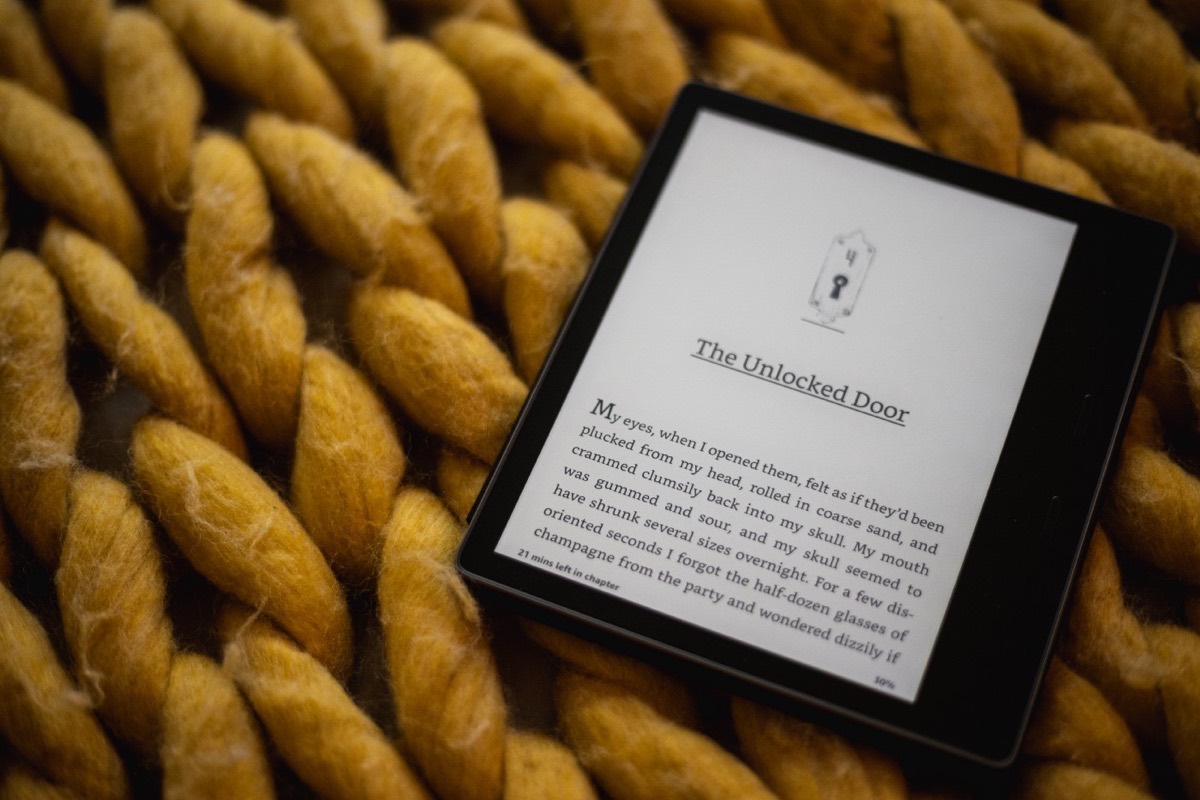
Read Fiction
As a journalist and technologist, I read a lot of articles and non-fiction as part of keeping current with my industries of interest.
But this kind of content is usually designed to wind us up, not down. So when it comes time to settle in for the night, I make sure my Kindle is well-stocked with fiction.
Any sort will do: classic novels, sci-fi epics, short stories, comedy. What matters is that I take the opportunity to detach a bit and absorb myself in the goings-on of another world. If it’s a better one, I bring back hope. If it’s a worse one, I bring back gratitude.
Either way, the detachment allows me to see the status quo from a new perspective. I can more easily let go of the circular thinking and anxiety that can easily overwhelm if we aren’t careful.

Make Time for Mindfulness
To the same end, I’ve found that any manner of mindfulness practice before bed can help keep anxiety at bay and promote more restful sleep.
Whether you have an existing meditation practice, or you prefer yoga, performing a mindful activity before you get into bed can help your brain wind down from the excitement of the day and ease into a less agitated state.
This doesn’t have to be anything esoteric; simple breathing exercises will do. The important part is to focus the entirety of your attention on this one task, not trying to do it in parallel with other things. Brushing your teeth can be meditative, but it’s not meditating.
Give yourself three, five, even fifteen minutes before bed to really relax into your chosen activity. Apps like Headspace and Calm can provide gentle guidance.
Be Present With Your Loved Ones
It’s okay to admit that we’re not at our strongest these days.
Stress can bring out the best and the worst in us — often at the same time. We assign blame, seeking to control situations beyond our grasp, but those impulses aren’t constructive and they aren’t welcome in the tender moments of settling in for the night.
The sheltered environment of your bedroom is a good place to try and see past those anxieties and remind yourself or your significant other that you don’t begrudge them this temporary fragility, that you love and support them, and that this too shall pass.
Sleep Well
Sleep is more valuable now than ever before; things take on a bleak pallor when viewed through tired eyes.
Whether you take some, none, or all of the above advice, I hope you make time to think about your evening routine more intentionally.
Try to identify any aspects of it that are impeding your ability to fall asleep — and stay asleep — and find ways to mitigate them.
Above all else, think of it as an investment in your health and wellbeing. Recognize that changes you make today can reward you for years to come, in times of trouble and in times of happiness.
Every little bit helps.
